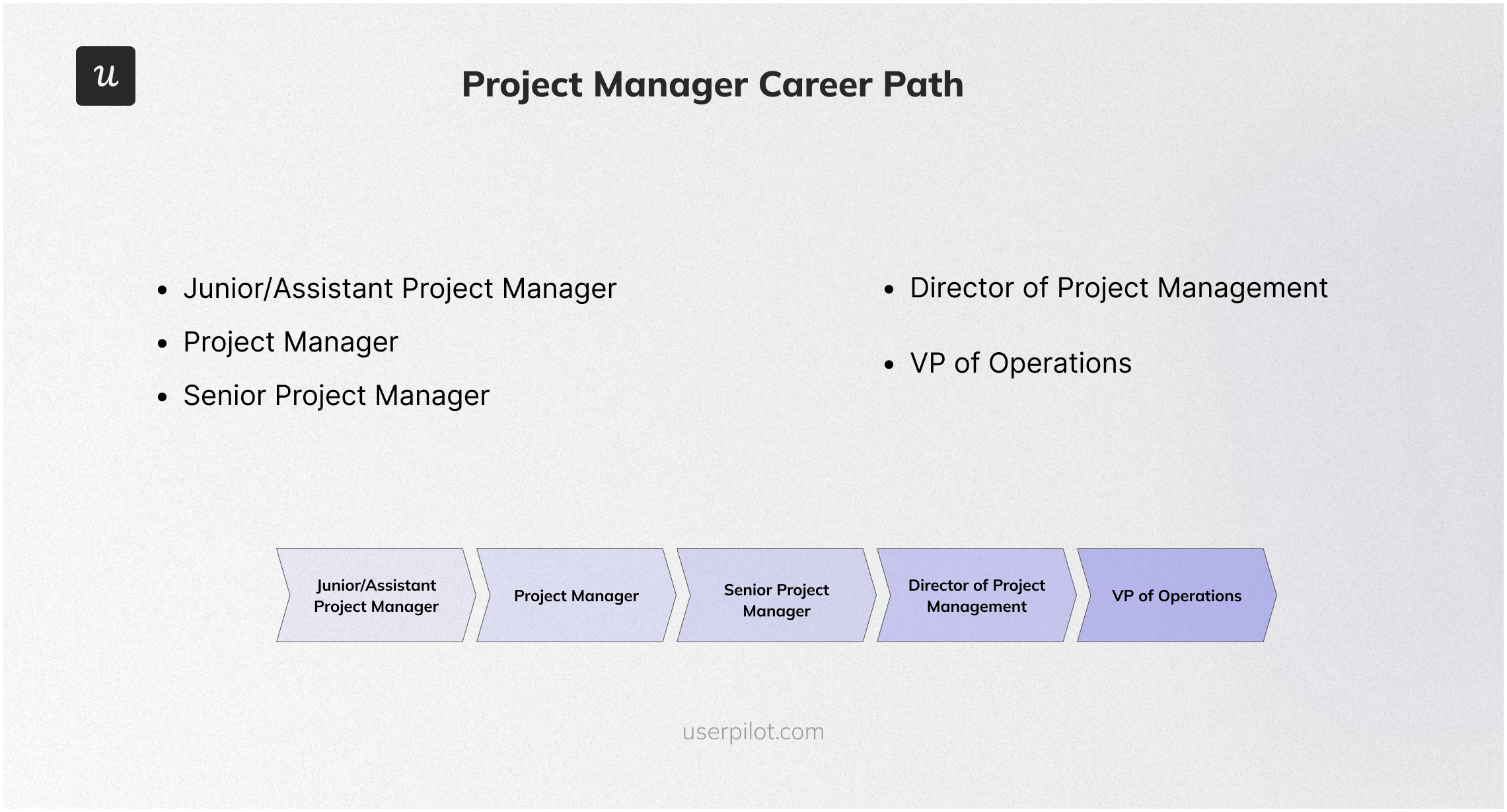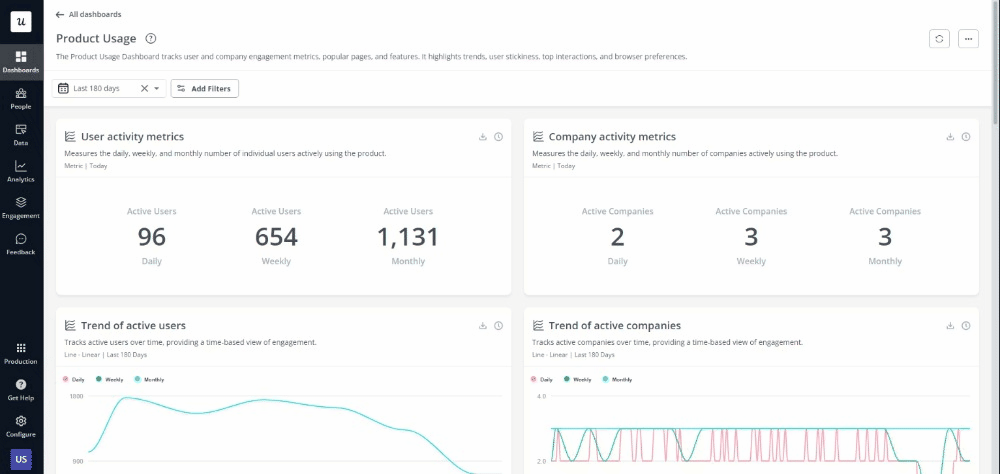
Get The Insights!
The fastest way to learn about Product Growth, Management & Trends.
What is the typical career path for project managers?
Project management is a career where you can see a clear path on the career ladder as your years of experience and your skills and expertise increase. Here is a typical project management career path starting from the entry-level role:
- Junior/Assistant Project Manager: This is the entry-level role in project management where you get to assist the project manager in coordinating and leading a project. In this role, you get to learn and gain hands-on experience in project management.
- Project Manager: From being the assistant project manager, you get promoted to the project manager. By now, you have a few years of experience under your belt and have gained a lot of skills and knowledge to lead a project yourself.
- Senior Project Manager: As a senior project manager, you will work on bigger projects or projects with longer timeframes. You will also coordinate a group of project managers under you to get the job done.
- Director of Project Management: The Director of Project Management oversees all the company’s projects.
- VP of Operations: The Vice President of Operations spearheads every project in the company. They guide the project managers under them on how to successfully manage a project.
How to become a project manager
Although it is not mandatory, most companies put a degree in business, management, or information technology in their job description, and having any of these degrees can give you a competitive edge. However, if you do not have the above degrees, you can take certification courses from reputed sites such as Coursera and Google and add them to your portfolio.
While taking these courses, you can join project management communities on Slack, Facebook, LinkedIn, and other social media platforms to network with people and start applying for entry-level roles in your desired companies.
Best resources for project managers
There are several resources for project managers ranging from books to podcasts to webinars to blogs for project managers all over the internet. Here is a compilation of the best resources for project managers who are looking to grow in their careers:
Best books for project managers
- Project Management Absolute Beginner’s Guide By Greg Horine: From planning a project to executing it and closing it, the book is an absolute guide for anyone looking to get started with project management.
- The Lazy Project Manager by Peter Taylor: This book explains how you can be more productive and work smart rather than hard in executing your projects.
- Project Management Case Studies By Harold Kerzner: The book contains over 100 case studies on project management from different industries and provides fundamental insights into project management.
- Making Things Happen: Mastering Project Management By Scott Berkun: In this book, Microsoft project manager veteran Scott Berkun gave tips on how to lead a group of people effectively to get the job done, and it is a must-read for every project manager.
- A Guide to the Project Management Body of Knowledge (PMBOK® Guide) by Project Management Institute: This comprehensive resource for project managers is a go-to guide for anyone looking for an in-depth book on project management. It covers project management extensively, providing case studies.
Best webinars for project managers
- Project Management Institute Webinars: The Project Management Institute produces webinars on a wide range of topics related to project management. If you want to broaden your knowledge in project management, check out the webinar.
- Brighttalk by TechTarget Webinars: Brighttalk by TechTarget webinar is another webinar that provides insights on the latest trends in project management.
- PMO Advisory Webinars: The PMO Advisory webinar covers not just project management topics but how to navigate your career as a project manager.
- HRDQU Webinars: HRDQU produces webinars around leadership in project management and is one you should check out to broaden your scope in leadership.
- Alliance Training Project Management Webinars: Facilitated by expert instructors, the webinar is a guide to project management for project managers.
Best blogs for project managers
- The Userpilot Blog: If you are a project manager for SaaS projects, the Userpilot blog contains a wealth of knowledge to make your project smooth and seamless.
- The Project Management Blog: The project management blog is a comprehensive blog about project management that covers a variety of topics.
- The PMStudent Blog: The PMStudent blog covers essential skills every project manager needs to master.
- The Girl’s Guide to Project Management Blog: Founded by Elizabeth Harrin, the blog teaches the skills needed in project management.
- The Project Management Basics Blog: In the blog are in-depth, comprehensive blog posts on how to be a better project manager.
Best podcasts for project managers
- The Project Management Podcast By Cornelius Fichtner: The project management podcast by Cornelius is one of the podcasts every project manager should listen to as it covers the various topics in project management.
- PMO Strategies by Laura Barnard: In this podcast, Laura invites project managers, and they discuss on essential things needed to take a project from start to success.
- People And Projects Podcast by Andy Kaufman: The People and Projects podcast is a podcast around project management and how to lead a team to complete a project successfully.
- Project Management Paradise: The podcast gathers insights from expert project managers worldwide and is a podcast every project manager should check out.
- The Project Management Happy Hour Podcast: The project management happy hour podcast revolves around problems encountered in project management today and how to overcome them.
Best tools for project managers
Tools are an essential part of project management, as the right tools can make your work easier and more effective. Here are the best tools for project managers:
- Best tool for project management for SaaS product teams (Userpilot): Userpilot is a product adoption tool that shows you insights into how users interact with your product, allowing you to make quality decisions that enhance your SaaS product projects.
- Best Tool for Project Roadmapping (Asana): When planning your project and you want to draw roadmaps to keep the project on track, Asana is one of the best tools to draw the roadmap and monitor the progress of your project.
- Best tool for team coordination (Jira): Jira is one of the best project management tools for keeping the team coordinated and activities centralized for effective tracking.
- Best tool for small project management teams (Basecamp): If your project management team is lean, basecamp is a simple and easy-to-navigate tool for effective management.
- Best for Project Overview and Visibility (Workzone): Workzone is the best tool when it comes to gaining project overview and visibility and helping you keep an eye on all the small projects assigned to each member of the team.
Conclusion
We hope our article has given you a good overview of the career path for project managers.
Whether you’re just starting out or looking to advance, the key is to stay curious, keep learning, and remain open to new opportunities along the way.
Looking into tools for project managers? Userpilot is an all-in-one product platform with engagement features and powerful analytics capabilities. Book a demo to see it in action!







